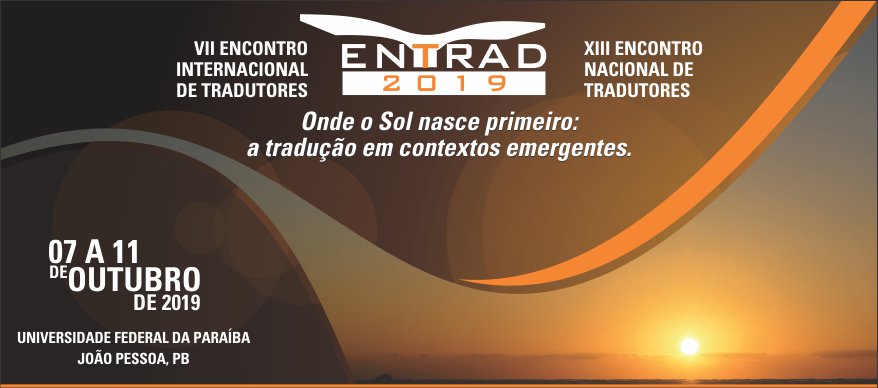Antes de se inscrever, leia as orientações AQUI
Traduzir Canções: objetivos, desafios, estratégias
Translating Songs: aims, challenges, strategies
Lauro Meller
UFRN
lauromeller@ymail.com
http://lattes.cnpq.br/3697926063029295
Natanael Ferreira França Rocha
UFSC
natanffr@gmail.com
http://lattes.cnpq.br/1334310722020905
Idiomas de trabalho | Work languages: Português, English, Español
Resumo: As instituições acadêmicas vêm assistindo, nas últimas décadas, a um crescente interesse pelos estudos de Música Popular, sendo a fundação da IASPM (International Association for the Study of Popular Music), na Universidade de Liverpool, em 1981, um importante marco nessa direção. No Brasil, já são muitas as teses e dissertações de pesquisadores brasileiros dedicadas a temas relacionados à Música Popular, e já sediamos congressos importantes na área, como o da IASPM-AL (América Latina). Por sua vez, os Estudos de Tradução, campo também relativamente recente nas academias, vem crescendo exponencialmente no cenário brasileiro nos últimos anos, haja vista a abertura de programas de Pós-Graduação em Tradução na USP, UFSC e UFC, dentre outros. A convergência entre essas duas áreas de investigação, ambas em processo de consolidação, parece ser um processo natural, haja vista ser antiga a prática de se traduzir canções para que sejam lançadas em mercados fonográficos estrangeiros, sendo um caso emblemático “The Girl from Ipanema”, versão do letrista norte-americano Norman Gimbel para o clássico de Tom e Vinicius (ROCHA, 2013); ou, em contrapartida, importar canções estrangeiras e lançá-las como versões no mercado nacional. As primeiras tentativas de sistematização do processo tradutório de canções remontam ao século XIX e à tradução de óperas. Nos últimos anos, no entanto, surgiram modelos teóricos específicos sobre a tradução de canções populares, como aquele desenvolvido por Peter LOW (2003, 2017), ou os estudos de KAINDL (2005) e FRANZON (2008). Em comum, destacam-se o foco na relação dialógica entre a música popular e vários tipos de elementos verbais, musicais, visuais, sociais e culturais, além da preocupação com os encaixes prosódicos, retórico-poéticos e musico-semânticos entre letra e música, em traduções que, obrigatoriamente devem ser cantáveis. Apesar da importância das contribuições supracitadas, observa-se, ainda, uma carência de organização e fichamento dos temas, bem como de um aprofundamento teórico substancial, razão pela qual convidamos os colegas pesquisadores a submeter trabalhos que se debrucem sobre o processo tradutório de canções. Pretende-se investigar a especificidade desse objeto, tanto em estudos de caso como em tentativas de sistematização teórico-metodológica. Algumas das questões ou temas que pretendemos contemplar neste GT incluem (mas não se restringem a): i) gêneros de canções mais ou menos propícios à tradução, tanto em termos de tecnicalidades da canção em si quanto por questões mercadológicas; ii) estratégias tradutórias aplicadas à canção: domesticação, exotização etc; iii) teorias da tradução aplicadas à canção; iv) análises sobre canções traduzidas tanto por compositores/intérpretes/letristas quanto por pesquisadores, dentre outros. Serão também bem-vindos trabalhos que versem sobre traduções de canções em situações multimodais, por exemplo, aquelas que aparecem em filmes, musicais, peças de teatro, animações e videoclipes, em que a inter-relação entre os múltiplos aspectos semióticos envolvidos torna-se ainda mais evidente. Os participantes poderão submeter propostas em português, inglês ou espanhol.
Palavras-chave: Tradução de Canções, Tradução Multimodal, Música Popular
Abstract: Academic institutions have witnessed a steady growth in Popular Music Studies, and the foundation of IASPM (International Association for the Study of Popular Music), at the University of Liverpool, in 1981, was an important landmark towards the consolidation of this field of study. In Brazil, the theses and dissertations written on this topic are already numerous, and we have hosted important conferences such as IASPM-AL (Latin American branch). Translation Studies, in turn, also a relatively new branch in the academia, has been growing exponentially in the Brazilian scenario in the past few years, seeing that USP, UFSC and UFC, among other universities, opened post-graduate programmes in Translation Studies. The convergence of these two areas, both still fighting for their consolidation, seems to come naturally if one remembers the practice of translating songs to be launched in foreign markets (an emblematic case being “The Girl from Ipanema”, the version written by American lyricist Norman Gimbel for the classic song by Tom Jobim and Vinicius de Moraes (ROCHA, 2013)); or, conversely, to import foreign songs and launch them in the domestic market and in a local language. The first attempts to systematize song translation date back to the 19th century and to the translation of operas. In the past years, however, specific theoretical models applied to the translation of popular songs appeared, like the one put forward by Peter LOW (2003, 2017), or the studies by KAINDL (2005) and FRANZON (2008). They all have in common the focus on the dialogic relationship between popular music and the several types of verbal, musical, visual, social and cultural elements, besides the concern with the prosodic, rhetoric-poetic and musico-semantic aspects in the interaction between lyrics and music, in translations which must be singable. In spite of the relevance of the aforementioned contributions, there is still a lack of organization and scrutiny of the themes, as well as a need to substantially deepen the theories. Therefore, we invite fellow researchers to submit papers that deal with the process of song translating. We aim at investigating the specificities of this practice, both through case studies and systemized theoretical-methodological studies. Some of the questions or themes that we intend to cover in this group include (but are not restricted to): i) song genres which are more or less prone to be translated, both in terms of the technicalities of songs per se or due to market reasons; ii) translation strategies applied to songs: domestication, exotification etc.; iii) translation theories applied to songs; iv) analyses of songs translated both by songwriters/singers/lyricists and by researchers, among others. Papers on the translation of songs in multimodal contexts will also be welcomed, for instance, songs in films, musicals, plays, animations and music videos, where the interrelationship between the multiple semiotic aspects involved are even more evident. Proposals can be submitted for consideration in either Portuguese, English or Spanish.
Keywords: Song Translation, Multimodal Translation, Popular Music
Antes de se inscrever, leia as orientações AQUI
